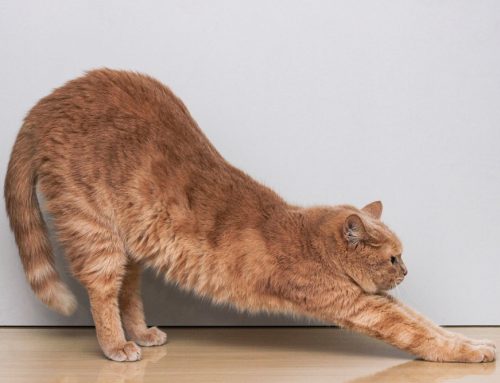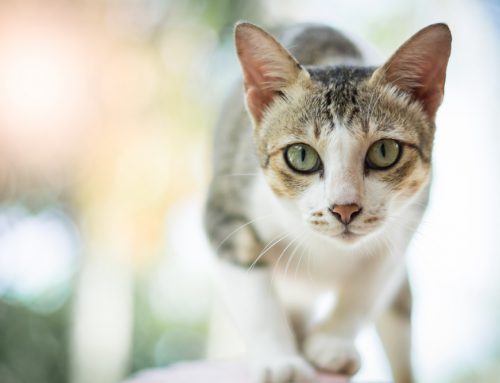While walking past your spare room, you notice the unmistakable smell of cat urine, and find several wet spots on the rug. And, the designer briefcase you bought after landing that big assignment was sprayed in the middle of the night. Can you get the urine smell out of Italian leather?
You love your cat, but you are frustrated and perplexed. What message are they trying to send?
Inappropriate elimination (i.e., urinating or defecating outside the litter box) can strain the strongest owner-cat relationship, and add stress, confusion, and frustration that often results in the surrender of the cat to a shelter. Billings Animal Family Hospital has the following recommendations for decoding your cat’s messages, and restoring your bond.
Why cats stop using the litter box
Cats are clean, fastidious creatures, so take note of any behavior changes. Reasons for house-soiling usually fall into one of four categories—medical, social or environmental, territorial (e.g., spraying or marking), and negative box associations.
#1: Medical reasons cats stop using their litter box
An appointment at Billings Family Animal Hospital is the first step to solving the mystery of your cat’s behavior. A complete physical exam will diagnose or rule out many conditions that can cause or worsen changes in litter box behavior. Diagnostics such as urinalysis, abdominal X-rays, or an ultrasound, can help evaluate your cat’s bladder and kidneys. Common medical causes for inappropriate urination include:
- Feline idiopathic cystitis
- Urinary stones
- Urinary tract infection
- Thyroid disease
- Diabetes mellitus
Always have your cat examined before making any changes to their environment or routine, since an underlying medical issue may undermine any attempts at problem-fixing.
#2: Social and environmental reasons cats avoid their litter box
Cats are sensitive to their surroundings, and the social hierarchy in a multi-cat household. Stressors of any kind can impact a cat’s litter-box use.
- Size — Litter boxes that are too small, hooded, or filled with a strongly perfumed litter may cause a cat to seek other options. Boxes should be open, large enough for the cat to comfortably turn around in, and filled with one to two inches of soft, clumping litter.
- Cleanliness — Cats like clean boxes. Scoop the litter box daily and thoroughly clean the entire box once a week.
- Number — Less confident cats may feel intimidated by dominant cats, who can be territorial over litter boxes. If bullied cats cannot access a litter box, they may resort to an unused room or closet for relief. Provide one litter box per cat, plus one additional box, and ensure they are accessible, and away from food and water bowls.
- Location — Litter box location can be a source of stress. Cats prefer quiet areas and need access to the box from all sides so they can retreat if threatened. Also, multiple litter boxes placed near each other are perceived as one big box, so space out the boxes.
- Routine — Changes in home routine and schedule, such as in 2020 when many families spent much more time than usual at home, can cause anxiety in cats.
- Special attention — Older cats need special considerations. Ensure they do not have to climb stairs to reach their litter box. Also, simply climbing into the box itself can be hard for arthritic joints, so trim the side wall, wrapping any sharp edges with duct tape for protection.
#3: Territorial reasons why cats stop using their litter box
Territorial marking or spraying may be highly undesirable in our homes, but is a natural cat behavior. Spaying and neutering can greatly reduce urine marking, but may not eliminate the behavior. When cats mark vertical and horizontal surfaces, their behavior is often associated with anxiety over a new object, a novel smell, the presence of an outdoor cat, or changes in household routine.
When urine marking occurs, clean the affected area and objects thoroughly with an enzymatic pet cleaner to prevent re-marking. Never clean the area with ammonia-based products, which smell like urine to cats. Keep floors and low areas free of new or unusual objects your cat may be tempted to mark. Add cat pheromone diffusers to your home to reduce general stress and anxiety.
#4: Negative associations that may cause cats to stop using the litter box

If something frightening, abnormal, or painful occurs while a cat is using the litter box, they may develop a negative association and actively avoid using their box. Some cats may enter, only to exit before eliminating.
After your veterinarian has ruled out painful medical conditions, litter box modifications, such as improving location and accessibility, may reduce your cat’s aversion. A new litter box and different litter type may help your cat establish a new pattern. Introduce the new box where your cat has been soiling, and then gradually move the box once proper use has been reestablished.
Cat owners appreciate a good mystery—that’s why we are attracted to these unusual and elusive companions. We also want to provide them with the best possible care, which is difficult when their messages are complex and difficult to understand. Contact Billings Animal Family Hospital to help decode your cat’s messages, and help them find relief—in the appropriate places.








Leave A Comment